英语反意疑问句用法归纳总结
英语反义疑问句的用法归纳
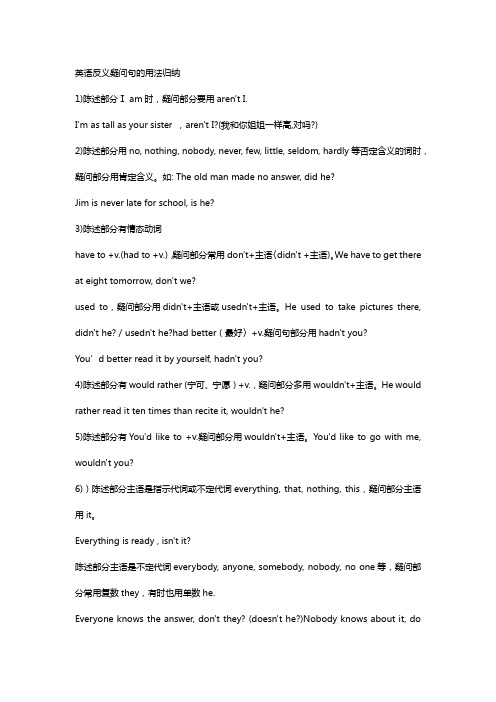
英语反义疑问句的用法归纳1)陈述部分Ⅰ am时,疑问部分要用aren't I.I'm as tall as your sister ,aren't I?(我和你姐姐一样高,对吗?)2)陈述部分用no, nothing, nobody, never, few, little, seldom, hardly等否定含义的词时,疑问部分用肯定含义。
如: The old man made no answer, did he?Jim is never late for school, is he?3)陈述部分有情态动词have to +v.(had to +v.),疑问部分常用don't+主语〈didn't +主语)。
We have to get there at eight tomorrow, don't we?used to,疑问部分用didn't+主语或usedn't+主语。
He used to take pictures there, didn't he? / usedn't he?had better(最好〉+v.疑问句部分用hadn't you?You’d better read it by yourself, hadn't you?4)陈述部分有would rather (宁可、宁愿)+v.,疑问部分多用wouldn't+主语。
He would rather read it ten times than recite it, wouldn't he?5)陈述部分有You'd like to +v.疑问部分用wouldn't+主语。
You'd like to go with me, wouldn't you?6))陈述部分主语是指示代词或不定代词everything, that, nothing, this,疑问部分主语用it。
(完整版)反意疑问句的用法归纳
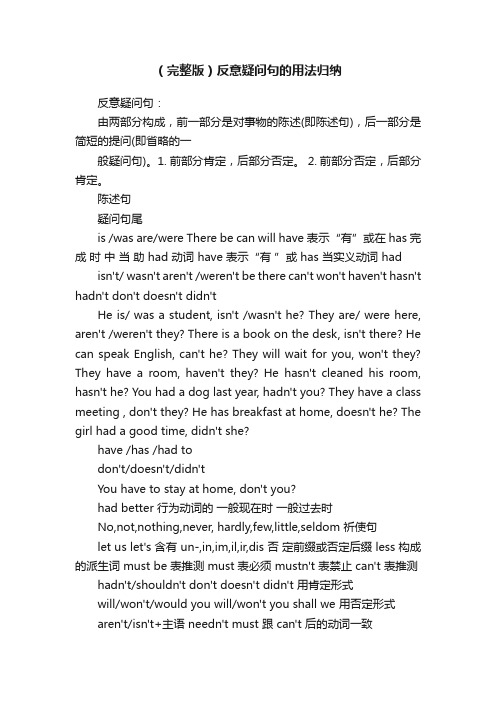
(完整版)反意疑问句的用法归纳反意疑问句:由两部分构成,前一部分是对事物的陈述(即陈述句),后一部分是简短的提问(即省略的一般疑问句)。
1. 前部分肯定,后部分否定。
2. 前部分否定,后部分肯定。
陈述句疑问句尾is /was are/were There be can will have 表示“有”或在 has 完成时中当助 had 动词 have 表示“有”或 has 当实义动词 had isn't/ wasn't aren't /weren't be there can't won't haven't hasn't hadn't don't doesn't didn'tHe is/ was a student, isn't /wasn't he? They are/ were here, aren't /weren't they? There is a book on the desk, isn't there? He can speak English, can't he? They will wait for you, won't they? They have a room, haven't they? He hasn't cleaned his room, hasn't he? You had a dog last year, hadn't you? They have a class meeting , don't they? He has breakfast at home, doesn't he? The girl had a good time, didn't she?have /has /had todon't/doesn't/didn'tYou have to stay at home, don't you?had better 行为动词的一般现在时一般过去时No,not,nothing,never, hardly,few,little,seldom 祈使句let us let's 含有 un-,in,im,il,ir,dis 否定前缀或否定后缀 less 构成的派生词 must be 表推测 must 表必须 mustn't 表禁止 can't 表推测hadn't/shouldn't don't doesn't didn't 用肯定形式will/won't/would you will/won't you shall we 用否定形式aren't/isn't+主语 needn't must 跟 can't 后的动词一致We'd better go now, hadn't/shouldn't we? They like playing football, don't they? He likes music, doesn't he? The woman bought a book, didn't she? He has hardly done his homework, has he? Please turn it on, will/won't/would you? Let us help him, will/won't you Let's have a rest, shall we? She dislikes it, doesn't she? You are unhappy, aren't you? You are hopeless, aren't you? He must be happy, isn't he ? You must do it today, needn't you? You mustn't talk like that, must you? He can't be a doctor, is he?I am 主从复合句 I think/believe/guess/ suppose+宾语从句并列句 used toaren't /ain't I; am I not I am your friend, aren't I一般跟主句一致He said she had been there, didn't he?动词和主语跟从句一 I think he'll come to help us, won't he? 致,用肯定还是否定 I don't think he is clever, is he? 根据主句来确定与邻近的分句一致Mary is here, but she was here just now, wasn't she?usedn't/didn'tHe used to be a teacher, usedn't/didn't he?5陈述句主语疑问句尾主语例句this, thatitThis is your brother, isn't it?These, thosetheyThese are not books, are they?oneone, heOne can't be always young, can one/he?something, anythingitNothing is serious, is it?everything, nothingEverything seems all right, doesn't it?everybody, everyoneEveryone knows this, don't they/doesn't he?somebody, someoneNobody likes to lose money, does he?anybody, anyonethey ,heNo one came , did they?nobody, no one,noneeither, neithereach ofthey ,heEach of the boys had an apple, didn't he /they?some(none) ofIt 或 they ,you None of the food was delicious, was it?Some of the men have come back, haven't they?or, and , neither…nor, either…or, both…and 复数代词Neither you nor I am wrong, are we? Both Tom and Jack came, didn't they?not only… but also not...but 等连接的并列主语不定式,动名词,从句或词组 the+ 形容词表示一类人 there 引起的句子it 复数代词 thereTo learn English well isn't easy, is it? Swimming is great fun,isn't it? The poor had no right to speak at that time, did they? There stands a house and a lot of trees, doesn't一、选择填空they? 6.--That's wrong, isn't it? -- ______1.Jim is a driver,_____?A. Yes, it is.B. Yes, it isn't.A. does heB. doesn't heC. is heD. isn't heC. No, it is.D. Yes, it was.2.You have a sports meeting every year,___? 7. Let's take a short rest, ______?A. have youB. do youA. do weB. aren't weC. haven't youD. don't youC. will youD. shall we3. He has never watched such an important8. Five-year-old children are too young to gomatch , _____ he?to school, ________ they?A. hasn'tB. hasC. isD. isn'tA. areB. aren'tC. wereD. have4.They have to work at once,______ they?9. Hundreds of people lost their lives in theA. haveB. haven'tC. doD. don'taccident,_______ they?5. She often feels tired,______ she?A. don'tB. didn'tC. doD. didA. doesn'tB. doesC. isD. isn't10.There isn't any bread on the table, ______?6A. isn't thereB. is thereC. has thereD. is it11. Mr King can not speak Chinese,____ he?A.doesn'tB. doesC. can'tD. can12. Lily didn't come to school, did she?____. She was ill in bed.A.No ,she didB. Yes , she did.C. No ,she didn't.D. Yes ,she didn't13.--She isn't a teacher, is she?--_____. She works in a hospital.A.No ,she isB. Yes , she is.C. No ,she isn't.D. Yes ,she isn't14.Lily looks like Lucy,_______?A. is LilyB. isn't sheC. does LillyD. doesn't she15.Tom often has lunch at school,_____?A. doesn't TomB. doesn't heC. does TomD. doesn't he16. Your family has no colour TV___it?A. hasn'tB. doesn'tC.isD. has17.You could hardly believe what he had said, _____ you?A. couldB. couldn'tC. canD. were18. --You don't smoke, do you?--______.A. Yes, I don'tB. No, I doC. No, I don'tD. Yes, I am.二、完成下列反意疑问句.1.You are late, ________ __________?2.He is on time,_________ _________?3.They were in the classroom just now,________ _________?4.She was ten years old last year_________________?5. They are going hiking next Sunday,________ _________?6.That cat is running up the tree.7.Ann is going to help me with my English8 There is some water in the bottle,___________________?9.There are many soldiers over there, _______ __________?10.He can skate, __________ ___________? 11.My parents can play chess,_____ ______? 12. They will work on the farm,________ _________? 13. My parents will visit my grandparents next Monday,________ _________? 14. They have written nine books since 1995,________ _________? 15, The woman has already found her son. ,________ _________? 16. They have three balls,_______ ______? 17. Jack has two sister,________ _______? 18.They have six classes every day,________ _________? 19.Tom has lunch at home,_____ _________?20.The students had a good time last Sunday,___________ ____________? 21. We have to finish it,______ ________? 22. The workers had to take the first bus, ________ _________? 23. You had better stay at home today, _________ __________? 24.We clean our classroom every day, ________ _________? 25. He watches TV on Saturday evening,________ _________? 26. The boys often play football on the playground,________ _________? 27.The singerswent to H.K yesterday, ________ _________? 28.They studied hard last year,________ _________? 29.They planted many trees last month,________ _________? 30.This pen is yours,_________ __________? 31.That was a wonderful film,______ _____?32.Everything is ready, ________ ________? 33.There is nothing wrong with the radio,___734.He did little homework yesterday, _______ __________?35.You'd like some coffee,______ ______? 36.Let's have a rest, _______ ____________? 37.Let us read the text, ________ ________?38.Don't read in bed, _________ _________? 39. Stop laughing,_______ __________? 40. He has to go there at eight,______ _____? 41.He has never been to Beijing, _____ ____? 42.She can hardly speak,_______ ________? 43.Few people know her here______ _____? 44.His mother was unhappy when she heard the news, _____ _______? 45.She dislikes watching football match____ ______? 46.He used to swim in the river,____ _____? 47.I think your brother is right, ____ ______?48. I don't think he will go there,____ _____?选择疑问句选择疑问句说话人对问题提出两个或两个以上的选项,让对方选择回答。
反义疑问句的5种用法归纳
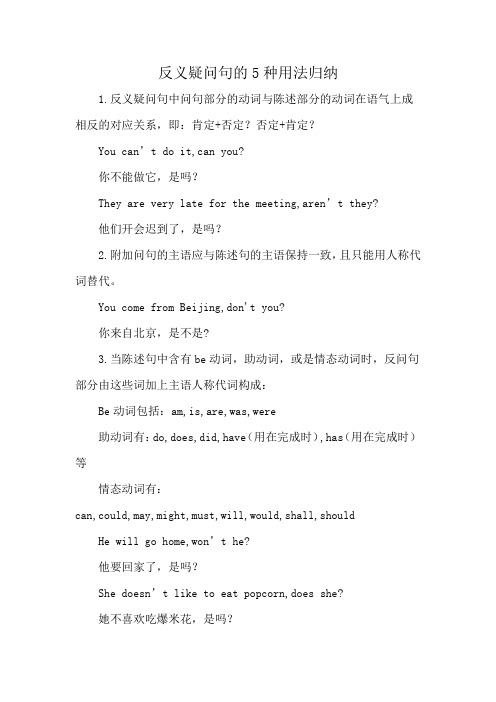
反义疑问句的5种用法归纳1.反义疑问句中问句部分的动词与陈述部分的动词在语气上成相反的对应关系,即:肯定+否定?否定+肯定?You can’t do it,can you?你不能做它,是吗?They are very late for the meeting,aren’t they?他们开会迟到了,是吗?2.附加问句的主语应与陈述句的主语保持一致,且只能用人称代词替代。
You come from Beijing,don't you?你来自北京,是不是?3.当陈述句中含有be动词,助动词,或是情态动词时,反问句部分由这些词加上主语人称代词构成:Be动词包括:am,is,are,was,were助动词有:do,does,did,have(用在完成时),has(用在完成时)等情态动词有:can,could,may,might,must,will,would,shall,should He will go home,won’t he?他要回家了,是吗?She doesn’t like to eat popcorn,does she?她不喜欢吃爆米花,是吗?4.have的不同用法,反义疑问句用不同的动词(1)have表“有”时,反义疑问句谓语动词用have/do都行He has a new car,doesn’t/hasn’t he?(2)have表“吃,喝,玩,度过,举办”等是,反义疑问句谓语动词用doHe has supper at home every day,doesn’t he?They had a good time in Beijing,didn’t they?(3)have to表“不得不,必须”时,反义疑问句谓语动词用doKite has to help her mother,doesn’t she?(4)had better表“最好”时,反义疑问句谓语动词用hadWe had better go to school at once,hadn't we?(5)have用在完成时中,反义疑问句谓语动词用haveThey have known the matter,haven’t they?5.(1)反义疑问句的陈述部分带有little,few,never,hardly,seldom,nobody,nothing,noone,none,neither等否定意义的词时,问句部分用肯定式。
反义疑问句的14种常考特殊用法
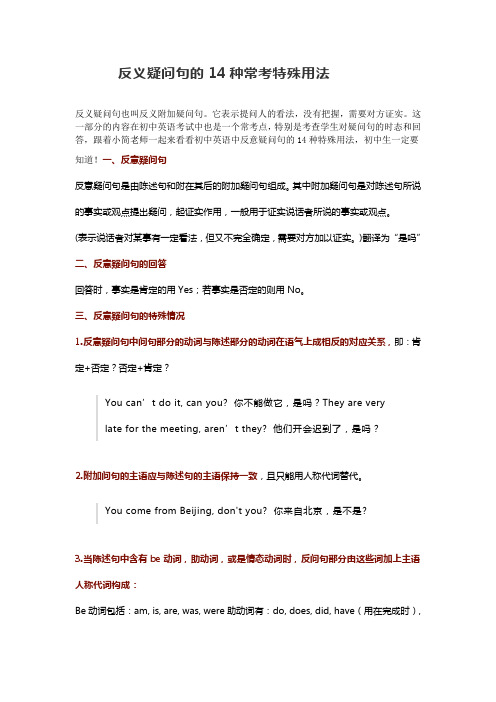
反义疑问句的14种常考特殊用法反义疑问句也叫反义附加疑问句。
它表示提问人的看法,没有把握,需要对方证实。
这一部分的内容在初中英语考试中也是一个常考点,特别是考查学生对疑问句的时态和回答,跟着小简老师一起来看看初中英语中反意疑问句的14种特殊用法,初中生一定要知道!一、反意疑问句反意疑问句是由陈述句和附在其后的附加疑问句组成。
其中附加疑问句是对陈述句所说的事实或观点提出疑问,起证实作用,一般用于证实说话者所说的事实或观点。
(表示说话者对某事有一定看法,但又不完全确定,需要对方加以证实。
)翻译为“是吗”二、反意疑问句的回答回答时,事实是肯定的用Yes;若事实是否定的则用No。
三、反意疑问句的特殊情况1.反意疑问句中问句部分的动词与陈述部分的动词在语气上成相反的对应关系,即:肯定+否定?否定+肯定?You can’t do it, can you? 你不能做它,是吗?They are verylate for the meeting, aren’t they? 他们开会迟到了,是吗?2.附加问句的主语应与陈述句的主语保持一致,且只能用人称代词替代。
You come from Beijing, don't you? 你来自北京,是不是?3.当陈述句中含有be动词,助动词,或是情态动词时,反问句部分由这些词加上主语人称代词构成:Be动词包括:am, is, are, was, were助动词有:do, does, did, have(用在完成时),has(用在完成时)等情态动词有:can, could, may, might, must, will, would, shall, shouldHe will go home, won’t he? 他要回家了,是吗?She doesn’tlike to eat popcorn, does she? 她不喜欢吃爆米花,是吗?4.have的不同用法,反义疑问句用不同的动词(1)have 表“有”时,反义疑问句谓语动词用have/do都行He has a new car, doesn’t/hasn’t he?(2)have表“吃,喝,玩,度过,举办”等是,反义疑问句谓语动词用doHe has supper at home every day, doesn’t he?They had agood time in Beijing, didn’t they?(3)have to表“不得不,必须”时,反义疑问句谓语动词用doKite has to help her mother, doesn’t she?(4)had better表“最好”时,反义疑问句谓语动词用hadWe had better go to school at once, hadn't we?(5)have用在完成时中,反义疑问句谓语动词用haveThey have known the matter, haven’t they?5.(1)反意疑问句的陈述部分带有little, few, never, hardly, seldom,nobody, nothing, no one, none, neither等否定意义的词时,问句部分用肯定式。
英语反意疑问句用法要点归纳

英语反意疑问句用法要点归纳1. 基本用法与结构反意疑问句由“陈述句+简略疑问句”两部分组成,第一部分提出一种看法,第二部分用来质疑或表示证实。
陈述部分与疑问部分的动词时态和动词性质应保持一致,而且肯定和否定形式彼此相反,即陈述部分为肯定式时,疑问部分用否定式,陈述部分为否定式时,疑问部分用肯定式:He likes English, doesn't he? 他喜欢英语,是吗?He doesn't like English, does he? 他不喜欢英语,是吗?【注】(1) 若陈述部分含有seldom, hardly, never, few, nothing 等否定词或半否定词,其疑问部分要用肯定式:He has few friends here, has he? 他在这儿几乎没什么朋友,是吗?She said nothing, did she? 她什么也没说,是不是?(2) 若陈述部分含有带否定前缀的词,疑问部分仍用否定式:It is unfair, isn't it? 这不公平,不是吗?It is impossible, isn't it? 那是不可能的,是吗?2. 反意疑问句的主语问题(1) 基本原则:疑问部分的主语应与陈述部分主语一致,且只能是代词:误:Mary is a nurse, isn't Mary?正:Mary is a nurse, isn't she? 玛丽是护士,对吗?(2) 当陈述部分为为there be句型时,疑问部分仍用there作“主语”:There was nothing in the room, was there? 房间里什么也没有,是吗?(3) 当陈述部分的主语是指示代词时,疑问部分用it, they等代词:That is a new car, isn't it? 这是一辆新汽车,是吗?(4) 当陈述部分的主语是复合不定代词时,若陈述部分的主语为somebody, someone, everyone, everybody, no one, nob ody等复合不定代词,其反意疑问句的主语在正式文体中用he,在口语或非正式文体中通常用they:Nobody was late, were they? 没有一个人迟到,是吗?当陈述部分的主语是 something, anything, nothing, every thing等复合不定代词时,其反意疑问句的主语要用it:Everything is ready, isn't it? 一切都准备好了吗?Nothing is important, is it? 没有什么重要的,不是吗?3. 陈述部分有动词have的反意疑问句(1) 当 have 为助动词时,其反意疑问句沿用同样的助动词:He has already left, hasn't he? 他已经离开了,是吗?(2) 当 have 为实意动词时,要分两种情况:①若表示“所有”,反意疑问句可以用have,也可以用do:He has a lot of friends here, hasn’t [doesn't] he? 他在这儿有许多朋友,是吗?但是若陈述部分用的是have的否定式,反意疑问句用have 还是用do,取决于陈述部分的动词形式:He hasn't any money, has he? 他没有钱,是吗?He doesn't have any money, does he? 他没有钱,是吗?②若表示“吃”、“玩”等意思,反意疑问句要用do:He has supper at 5, doesn't he? 他5点吃晚餐,是吗?He had a good time at the party, didn't he? 他在晚会上玩得很开心,是吗?(3) 当用于have to时,通常也有两种可能:若表示经常性的行为,则多用加助动词do的形式;若表示特定的行为,则多用ha ve:He often has to get up early, doesn't he? 他经常要早起,是吗?He has to go to bed late tonight, hasn't he? 他今晚要迟睡,是吗?4. 含情态动词的反意疑问句(1) 基本原则:在通常情况下,当陈述部分含有情态动词时,疑问部分会重复前面同样的情态动词:He can speak English, can't he?他会说英语,是吗?We shouldn't go, should we? 我们不应该去,对不对?(2) 当陈述部分含有must时,要分两种情况:①若must表示“必须”或“有必要”,疑问部分用 mustn't 或needn't:You must leave at once, mustn't [needn't] you? 你必须(有必要)马上离开,是吗?但是若陈述部分有mustn't表示禁止,疑问部分要must:You mustn't laugh, must you? 你不准笑,知道吗?②若must表示推测,疑问部分不能用must,而应根据mus t后的动词结构采用相应的动词形式:He must be tired, isn't he? 他一定累了,是吗?5. 陈述部分为祈使句的反意疑问句(1) 基本原则:若陈述部分为祈使句,疑问部分通常用will yo u:Please help us, will you? 请帮帮我们,好吗?Come with us, will you? 同我们一起去,好吗?Don't forget to post the letter, will you? 请别忘了寄信。
英语中反义疑问句的用法归纳

英语中反义疑问句的用法归纳反义疑问句用法归纳一、基本概念反义疑问句由两部分组成:前一部分是一个陈述句,后一部分是一个简短的疑问句,两部分的人称和时态应保持一致。
二、基本用法1. 肯定陈述句 + 否定疑问句例如:You like music, don't you? (你喜欢音乐,不是吗?)2. 否定陈述句 + 肯定疑问句例如:He doesn't like sports, does he? (他不喜欢运动,是吗?)3. 祈使句 + 反义疑问句(1)Let's 开头的祈使句,用 shall we?例如:Let's go for a walk, shall we? (我们去散步,好吗?)(2)Let us 开头的祈使句,用 will you?例如:Let us have a rest, will you? (让我们休息一下,好吗?)(3)其他祈使句,用 will you?例如:Open the door, will you? (打开门,好吗?)4. 含有 must 的反义疑问句(1)must 表示“必须”时,用 needn't例如:You must finish your homework today, needn't you? (你今天必须完成作业,不是吗?)(2)must 表示推测“一定,肯定”时,根据实际情况而定例如:He must be very tired, isn't he? (他一定很累了,不是吗?)5. 含有否定词的反义疑问句当陈述句中有 never, few, little, nothing, nobody 等否定词时,反义疑问句用肯定形式。
例如:There is nothing in the box, is there? (盒子里什么都没有,是吗?)三、固定搭配1. “I am + 表语”,反义疑问句用“aren't I”例如:I'm late, aren't I? (我迟到了,不是吗?)2. 陈述部分是“there be”结构,反义疑问句用“be there”例如:There is a book on the desk, isn't there? (桌子上有一本书,不是吗?)3. 当陈述部分主语是不定代词 everyone, somebody, nobody, everyone 等时,反义疑问句用 they 或 he例如:Everyone is here, aren't they? (大家都在这儿,不是吗?)4. 当陈述部分主语是 this, that 时,反义疑问句用 it;当陈述部分主语是 these, those 时,反义疑问句用 they例如:This is a pen, isn't it? (这是一支钢笔,不是吗?)5. 当陈述部分是主从复合句时,反义疑问句与主句的主语和谓语保持一致例如:He said he would come, didn't he? (他说他会来,不是吗?)双语例句:1. I have a lot of friends, don't I? (我有很多朋友,不是吗?)2. She doesn't speak French, does she? (她不会说法语,是吗?)3. Have a cup of coffee, will you? (喝杯咖啡,好吗?)4. We should study hard, shouldn't we? (我们应该努力学习,不是吗?)5. They have been to Beijing, haven't they? (他们去过北京,不是吗?)6. You aren't a doctor, are you? (你不是医生,对吧?)7. There are some apples on the tree, aren't there? (树上有一些苹果,不是吗?)8. Nobody knows the answer, do they? (没人知道答案,对吧?)9. This isn't your book, is it? (这不是你的书,对吧?)10. Those are beautiful flowers, aren't they? (那些是漂亮的花,不是吗?)11. He can swim very well, can't he? (他游泳游得很好,不是吗?)12. She never tells lies, does she? (她从不说谎,对吧?)13. We had a great time yesterday, didn't we? (我们昨天玩得很开心,不是吗?)14. If it rains tomorrow, we won't go hiking, will we? (如果明天下雨,我们就不去徒步了,对吧?)15. You think he is right, don't you? (你认为他是对的,不是吗?)16. Mary has few friends here, does she? (玛丽在这儿几乎没朋友,对吧?)17. The boy doesn't like vegetables, does he? (这男孩不喜欢蔬菜,是吗?)18. Everyone wants to be happy, don't they? (每个人都想快乐,不是吗?)19. I'm a good student, aren't I? (我是个好学生,不是吗?)20. He told you the truth, didn't he? (他告诉你真相了,不是吗?)。
英语反义疑问句的用法归纳总结

英语反义疑问句的用法归纳总结引言英语中的反义疑问句是一种常用的语法结构,用于提出问题或询问对方是否同意或不同意某种观点。
本文将归纳总结英语中反义疑问句的用法,包括构成、基本规则和常见应用场景。
构成英语中的反义疑问句通常由两个部分组成:一个主句和一个疑问句。
主句是一个陈述句,疑问句是一个疑问句。
一个常见的构成模式是:主句前面是陈述句,疑问句使用反意疑问句结构。
例如:•陈述句 + 否定疑问句:He is a doctor, isn’t he?•陈述句 + 肯定疑问句:She can swim, can’t she?基本规则在构成反义疑问句时,需要注意以下基本规则:1.陈述部分和疑问部分之间通常存在反义关系。
例如,如果陈述句是肯定的,则疑问句应该是否定的;反之亦然。
2.反义疑问句中的疑问部分与主句的主语和谓语形式保持一致。
例如,如果主句使用了肯定形式的动词,疑问部分也应该使用相应的肯定形式的助动词。
3.如果主句陈述的是事实,疑问部分应该使用反义疑问句,如果主句陈述的是假设或假想,疑问部分应该使用普通疑问句。
常见应用场景反义疑问句在日常交流中非常常见,常用于以下情况:1. 确认陈述句反义疑问句经常用于确认陈述句的正确性或错误性。
例如:•You are a student, aren’t you?•This is the right way, isn’t it?2. 做出请求反义疑问句也可以用于向对方提出请求,表示期待对方同意或不同意。
例如:•Let’s go to the cinema, shall we?•Help me with this, will you?3. 提出建议反义疑问句还常用于提出建议,询问对方是否同意或不同意。
例如:•We should go on a trip, shouldn’t we?•Why don’t you try this new restaurant, eh?4. 表示礼貌在表示礼貌或客气时,也常使用反义疑问句。
反义疑问句知识点总结全面
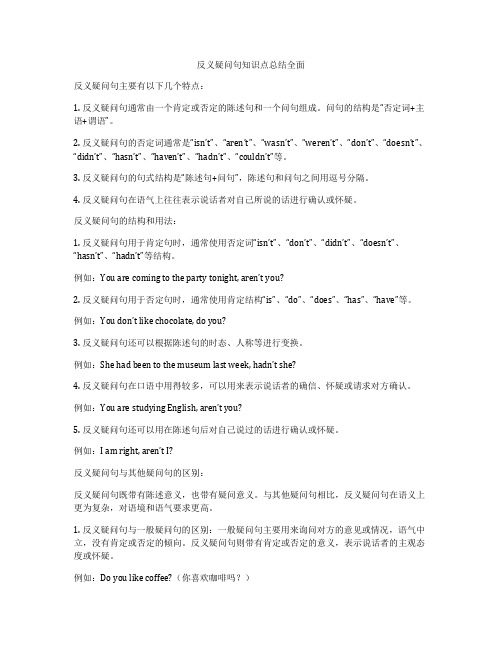
反义疑问句知识点总结全面反义疑问句主要有以下几个特点:1. 反义疑问句通常由一个肯定或否定的陈述句和一个问句组成。
问句的结构是“否定词+主语+谓语”。
2. 反义疑问句的否定词通常是“isn’t”、“aren’t”、“wasn’t”、“weren’t”、“don’t”、“doesn’t”、“didn’t”、“hasn’t”、“haven’t”、“hadn’t”、“couldn’t”等。
3. 反义疑问句的句式结构是“陈述句+问句”,陈述句和问句之间用逗号分隔。
4. 反义疑问句在语气上往往表示说话者对自己所说的话进行确认或怀疑。
反义疑问句的结构和用法:1. 反义疑问句用于肯定句时,通常使用否定词“isn’t”、“don’t”、“didn’t”、“doesn’t”、“hasn’t”、“hadn’t”等结构。
例如:You are coming to the party tonight, aren’t you?2. 反义疑问句用于否定句时,通常使用肯定结构“is”、“do”、“does”、“has”、“have”等。
例如:You don’t like chocola te, do you?3. 反义疑问句还可以根据陈述句的时态、人称等进行变换。
例如:She had been to the museum last week, hadn’t she?4. 反义疑问句在口语中用得较多,可以用来表示说话者的确信、怀疑或请求对方确认。
例如:You are studying English, aren’t you?5. 反义疑问句还可以用在陈述句后对自己说过的话进行确认或怀疑。
例如:I am right, aren’t I?反义疑问句与其他疑问句的区别:反义疑问句既带有陈述意义,也带有疑问意义。
与其他疑问句相比,反义疑问句在语义上更为复杂,对语境和语气要求更高。
1. 反义疑问句与一般疑问句的区别:一般疑问句主要用来询问对方的意见或情况,语气中立,没有肯定或否定的倾向。
反义疑问句的用法归纳
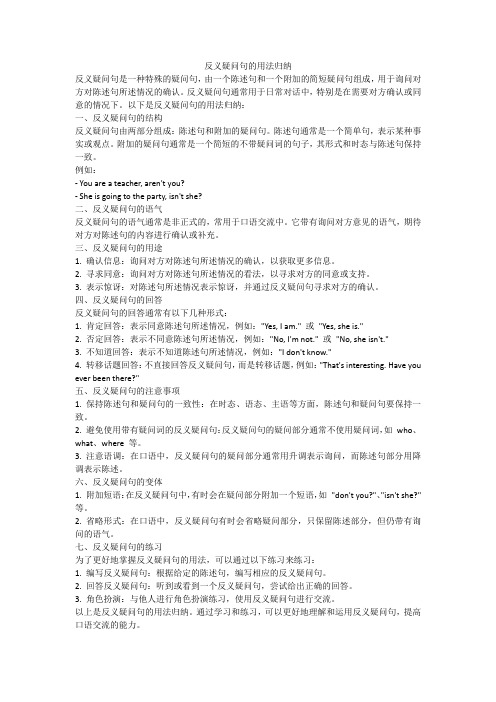
反义疑问句的用法归纳反义疑问句是一种特殊的疑问句,由一个陈述句和一个附加的简短疑问句组成,用于询问对方对陈述句所述情况的确认。
反义疑问句通常用于日常对话中,特别是在需要对方确认或同意的情况下。
以下是反义疑问句的用法归纳:一、反义疑问句的结构反义疑问句由两部分组成:陈述句和附加的疑问句。
陈述句通常是一个简单句,表示某种事实或观点。
附加的疑问句通常是一个简短的不带疑问词的句子,其形式和时态与陈述句保持一致。
例如:- You are a teacher, aren't you?- She is going to the party, isn't she?二、反义疑问句的语气反义疑问句的语气通常是非正式的,常用于口语交流中。
它带有询问对方意见的语气,期待对方对陈述句的内容进行确认或补充。
三、反义疑问句的用途1. 确认信息:询问对方对陈述句所述情况的确认,以获取更多信息。
2. 寻求同意:询问对方对陈述句所述情况的看法,以寻求对方的同意或支持。
3. 表示惊讶:对陈述句所述情况表示惊讶,并通过反义疑问句寻求对方的确认。
四、反义疑问句的回答反义疑问句的回答通常有以下几种形式:1. 肯定回答:表示同意陈述句所述情况,例如:"Yes, I am." 或"Yes, she is."2. 否定回答:表示不同意陈述句所述情况,例如:"No, I'm not." 或"No, she isn't."3. 不知道回答:表示不知道陈述句所述情况,例如:"I don't know."4. 转移话题回答:不直接回答反义疑问句,而是转移话题,例如:"That's interesting. Have you ever been there?"五、反义疑问句的注意事项1. 保持陈述句和疑问句的一致性:在时态、语态、主语等方面,陈述句和疑问句要保持一致。
反义疑问句(含解析、例句及详尽用法)
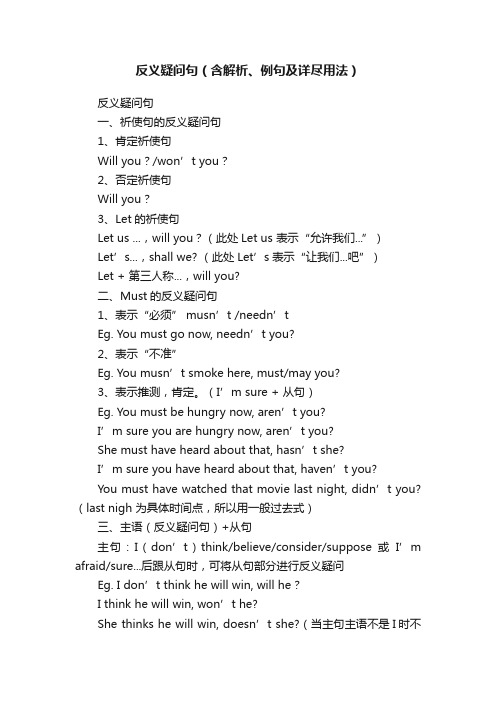
反义疑问句(含解析、例句及详尽用法)反义疑问句一、祈使句的反义疑问句1、肯定祈使句Will you?/won’t you?2、否定祈使句Will you?3、Let的祈使句Let us ...,will you?(此处Let us 表示“允许我们...”)Let’s...,shall we? (此处Let’s表示“让我们...吧”)Let + 第三人称...,will you?二、Must的反义疑问句1、表示“必须” musn’t /needn’tEg. You must go now, needn’t you?2、表示“不准”Eg. You musn’t smoke here, must/may you?3、表示推测,肯定。
(I’m sure + 从句)Eg. You must be hungry now, aren’t you?I’m sure you are hungry now, aren’t you?She must have heard about that, hasn’t she?I’m sure you have heard about that, haven’t you?You must have watched that movie last night, didn’t you?(last nigh 为具体时间点,所以用一般过去式)三、主语(反义疑问句)+从句主句:I(don’t)think/believe/consider/suppose 或I’m afraid/sure...后跟从句时,可将从句部分进行反义疑问Eg. I don’t think he will win, will he?I think he will win, won’t he?She thinks he will win, doesn’t she?(当主句主语不是I时不适用于该用法,此句中的翻译疑问针对的是主句而非从句)四、当句中包含有表示否定意义的副词或不定代词时,反义疑问句用肯定形式Eg. Nothing happened to him, did it?It is unfair, isn’t it?He dis likes watching TV, doesn’t he?(该句中含否定意义的是动词而非副词或不定代词,因此不适用于该用法,反义疑问句仍然使用否定形式)五、反义疑问句的回答反义疑问句的回答针对被提问部分的谓语动词,且与回答句前部分的Yes和No 保持一致Eg. A: You haven’t lost the ticket, have you?B: D I know it’s hard to get another one at this moment.A. Yes, I haven’tB. No, I haveC. I hope soD. I’m afraid not六、陈述部分的主语与反义疑问句主语保持一致的情况1、OneEg. One can’t be too careful when driving a car, can one/he?一个人在开车的时候再怎么小心也不为过。
反意疑问句语法归纳
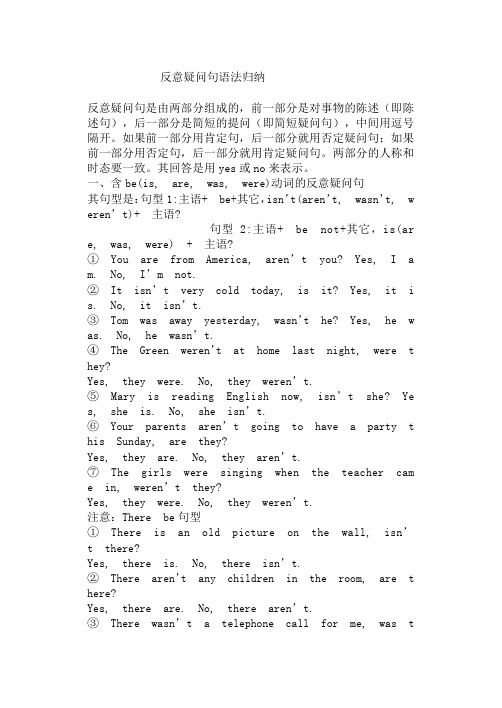
反意疑问句语法归纳反意疑问句是由两部分组成的,前一部分是对事物的陈述(即陈述句),后一部分是简短的提问(即简短疑问句),中间用逗号隔开。
如果前一部分用肯定句,后一部分就用否定疑问句;如果前一部分用否定句,后一部分就用肯定疑问句。
两部分的人称和时态要一致。
其回答是用yes或no来表示。
一、含be(is, are, was, were)动词的反意疑问句其句型是:句型1:主语+ be+其它,isn’t(aren’t, wasn’t, w eren’t)+ 主语?句型2:主语+ be not+其它,is(are, was, were) + 主语?① You are from America, aren’t you? Yes, I am. No, I’m not.② It isn’t very cold today, is it? Yes, it is. No, it i sn’t.③ Tom was away yesterday, wasn’t he? Yes, he was. No, he wasn’t.④ The Green weren’t at home last night, were the y?Yes, they were. No, they weren’t.⑤ Mary is reading English now, isn’t she? Yes, she i s. No, she isn’t.⑥ Your parents aren’t going to have a party this Sunda y, are they?Yes, they are. No, they aren’t.⑦ The girls were singing when the teacher came in, were n’t they?Yes, they were. No, they weren’t.注意:There be句型① There is an old picture on the wall, isn’t there? Yes, there is. No, there isn’t.② There aren’t any children in the room, are there? Yes, there are. No, there aren’t.③ There wasn’t a telephone call for me, was there? Yes, there was. No, there wasn’t.④ There were enough people to pick apples, weren’t there?Yes, there were. No there weren’t.二、行为动词的一般现在时的反意疑问句其句型是:句型1: 主语+动词原形+其它,don’t I(you, we, t hey)?句型2: 主语+ don’t+动词原形+其它,do I(you, w e, they)?句型3: 主语+动词第三人称单数+其它,doesn’t he(she, it)?句型4: 主语+ doesn’t+动词原形+其它,does he(s he, it)?① You often watch TV in the evening, don’t you? Ye s, I do. No, I don’t.② The students don’t study hard, do they? Yes, they d o. No, they don’t.③ Mary studies Chinese hard, doesn’t she? Yes, she do es. No, she doesn’t.④ The boy doesn’t often go to school by bike, does he? Yes, he does. No, he doesn’t.⑤ The first class begins at eight, doesn’t it? Yes, i t does. No, it doesn’t.三、行为动词的一般过去时的反意疑问句其句型是:句型1: 主语+动词过去式+其它,didn’t+主语?句型2: 主语+didn’t+动词原形+其它,did +主语?① You watched TV last night, didn’t you? Yes, I did. N o, I didn’t.② Jim’s parents didn’t go to Hong Kong last month, did they?Yes, they did. No, they didn’t.③ The rain stopped, didn’t it? Yes, it did. No, it di dn’t.④ Mr. Clarke didn’t buy a car, didn’t he? Yes, he did. No, he didn’t.四、一般将来时的反意疑问句其句型是:句型1: 主语+will+动词原形+其它,won’t+主语?句型2: 主语+ won’t +动词原形+其它,will +主语?① The boys will play games, won’t they? Yes, they wi ll. No, they won’t.② It won’t stop raining, will it? Yes, it will. N o, it won’t.③ Mr. Smith will visit our school next week, won’t h e? Yes, he will. No, he won’t.注意:There be句型的一般将来时① There will be a basketball match tomorrow, won’t the re?Yes, there will. No, there won’t.② There won’t be too much pollution in the future, w ill there?Yes, there will. No, there won’t.五、现在完成时的反意疑问句其句型是:句型1: 主语+have+动词过去分词+其它,haven’t+主语?句型2: 主语+ haven’t +动词过去分词+其它,hav e +主语?句型3: 主语+has+动词过去分词+其它,hasn’t+主语?句型4: 主语+ hasn’t +动词过去分词+其它,has +主语?① You have been to Shanghai before, haven’t you? Ye s I have. No, I haven’t.② You haven’t been to Shanghai before, have you? Ye s I have. No, I haven’t.③ Jack has done his homework, hasn’t he? Yes, he ha s. No, he hasn’t.④ Jack hasn’t done his homework, has he? Yes, he ha s. No, he hasn’t.六、现在完成进行时的反意疑问句其句型是:句型1: 主语+have been+动词现在分词+其它,haven’t+主语?句型2: 主语+ haven’t been +动词现在分词+其它,have +主语?句型3: 主语+has been +动词现在分词+其它,hasn’t+主语?句型4: 主语+ hasn’t been +动词现在分词+其它,has +主语?① You have been skating for five hours, haven’t you? Y es, I have. No, I haven’t.② You haven’t been skating for five hours, have you? Y es, I have. No, I haven’t.③ Bob has been collecting kites since 1999, hasn’t h e? Yes, he has. No, he hasn’t.④ Bob hasn’t been collecting kites since 1999, has h e? Yes, he has. No, he hasn’t.七、含有情态动词的反意疑问句其句型是:句型1: 主语+情态动词+动词原形+其它,情态动词否定形式+主语?句型2: 主语+情态动词否定形式+动词原形+其它,情态动词+主语?① You can speak French, can’t you? Yes, I can. No, I c an’t.② They can’t understand me, can they? Yes, they can. N o, they can’t.③ Ann could swim when she was six, couldn’t she? Yes, s he could. No, she couldn’t.④ The students must study hard, mustn’t they? Yes, the y must. No, they needn’t.注意:You must go home now, needn’t you? Yes, I must. N o, I needn’t.★值得注意的是有时英语的谓语动词并不用否定式(即没加上not),而是用上了“never, little, few, hardly, nothing, nobody”等词,这时该陈述句也属于否定句,因此,反意疑问句的后半部分应用肯定疑问式。
反义疑问句用法(最新全)
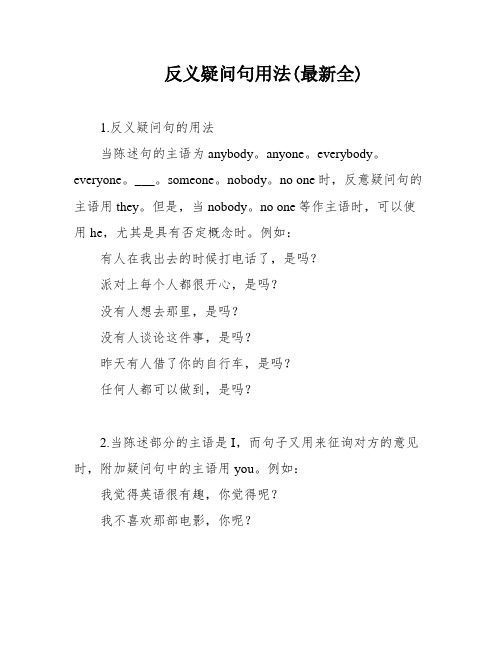
反义疑问句用法(最新全)1.反义疑问句的用法当陈述句的主语为anybody。
anyone。
everybody。
everyone。
___。
someone。
nobody。
no one时,反意疑问句的主语用they。
但是,当nobody。
no one等作主语时,可以使用he,尤其是具有否定概念时。
例如:有人在我出去的时候打电话了,是吗?派对上每个人都很开心,是吗?没有人想去那里,是吗?没有人谈论这件事,是吗?昨天有人借了你的自行车,是吗?任何人都可以做到,是吗?2.当陈述部分的主语是I,而句子又用来征询对方的意见时,附加疑问句中的主语用you。
例如:我觉得英语很有趣,你觉得呢?我不喜欢那部电影,你呢?3.当陈述句的主语为everything。
anything。
nothing。
something等时,反意疑问句的主语用it。
例如:一切都好,是吗?没有什么可以阻止我们前进,是吗?4.当陈述部分的主语是指示代词this。
that或these。
those 时,附加疑问句中的主语分别用it和they。
例如:这很重要,是吗?那不正确,是吗?这些是你的朋友___和___,是吗?5.当陈述句的主语为one时,在正式情况下反义疑问句的主语用one,在非正式情况下用you。
例如:人们应该向别人研究,不是吗?人不能成为自己的主人,是吗?When ___ such as "had better," "would rather," "would like,"or "ought to," the tag n should use the corresponding auxiliary verb。
For example。
"You'd better go now。
hadn't you?" or "He'd like to go there。
(完整版)反义疑问句的用法归纳及习题

(完整版)反义疑问句的⽤法归纳及习题反意疑问句【反意疑问句】(⼀)概念:反意疑问句是由陈述句和附在其后的附加疑问句组成。
其中附加疑问句是对陈述句所说的事实或观点提出疑问,起证实作⽤,⼀般⽤于证实说话者所说的事实或观点。
(⼆)要点注意:1、反意疑问句前后两部分谓语应是:“肯定陈述+否定疑问”或“否定陈述+肯定疑问”。
2、简略问句如果是否定式:not应与be,do,will等系动词、助动词、情态动词缩写。
3、简略问句的主语不⽤名词,应⽤⼈称代词。
4、陈述部分含“too...to”时,是否定句。
(三)⽤法:1) 陈述部分I am时,疑问部分要⽤aren't I.I'm as tall as your sister,aren't I?(我和你姐姐⼀样⾼,对吗?)2) 陈述部分⽤no, nothing, nobody, never, few, little, seldom, rarely,hardly等否定含义的词时,疑问部分⽤肯定含义。
如:The old man made no answer, did he?Jim is never late for school, is he?3) 陈述部分有情态动词have to +v. (had to + v.),疑问部分常⽤don't +主语(didn't +主语)。
We have to get there at eight tomorrow, don't we?used to,疑问部分⽤didn't +主语或usedn't +主语。
He used to take pictures there, didn't he? / usedn't he?had better(最好)+ v. 疑问句部分⽤hadn't you?You'd better read it by yourself, hadn't you?4) 陈述部分有would rather(宁可、宁愿)+v.,疑问部分多⽤wouldn't +主语。
反义疑问句(含解析、例句及详尽用法)
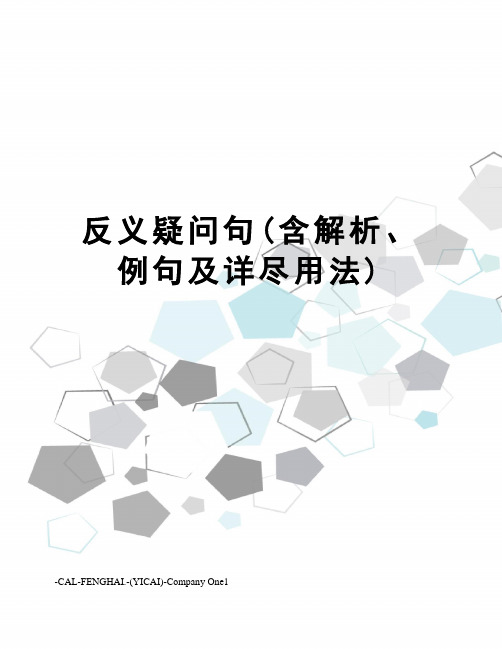
反义疑问句(含解析、例句及详尽用法)-CAL-FENGHAI.-(YICAI)-Company One1反义疑问句一、祈使句的反义疑问句1、肯定祈使句Will you/won’t you2、否定祈使句Will you3、Let的祈使句Let us ...,will you(此处Let us 表示“允许我们...”)Let’s...,shall we (此处Let’s表示“让我们...吧”)Let + 第三人称...,will you二、Must的反义疑问句1、表示“必须” musn’t /needn’tEg. You must go now, needn’t you2、表示“不准”Eg. You musn’t smoke here, must/may you3、表示推测,肯定。
(I’m sure + 从句)Eg. You must be hungry now, aren’t youI’m sure you are hungry now, aren’t youShe must have heard about that, hasn’t sheI’m sure you have heard about that, haven’t youYou must have watched that movie last night, didn’t you(last nigh为具体时间点,所以用一般过去式)三、主语(反义疑问句)+从句主句:I(don’t)think/believe/consider/suppose 或 I’m afraid/sure...后跟从句时,可将从句部分进行反义疑问Eg. I don’t think he will win, will heI think he will win, won’t heShe thinks he will win, doesn’t she(当主句主语不是I时不适用于该用法,此句中的翻译疑问针对的是主句而非从句)四、当句中包含有表示否定意义的副词或不定代词时,反义疑问句用肯定形式Eg. Nothing happened to him, did itIt is unfair, isn’t itHe dislikes watching TV, doesn’t he(该句中含否定意义的是动词而非副词或不定代词,因此不适用于该用法,反义疑问句仍然使用否定形式)五、反义疑问句的回答反义疑问句的回答针对被提问部分的谓语动词,且与回答句前部分的Yes和No 保持一致Eg. A: You haven’t lost the ticket, have youB: D I know it’s hard to get another one at this moment.A. Yes, I haven’tB. No, I haveC. I hope soD. I’m afraid not六、陈述部分的主语与反义疑问句主语保持一致的情况1、OneEg. One can’t be too careful when driving a car, can one/he一个人在开车的时候再怎么小心也不为过。
(完整版)反义疑问句用法归纳
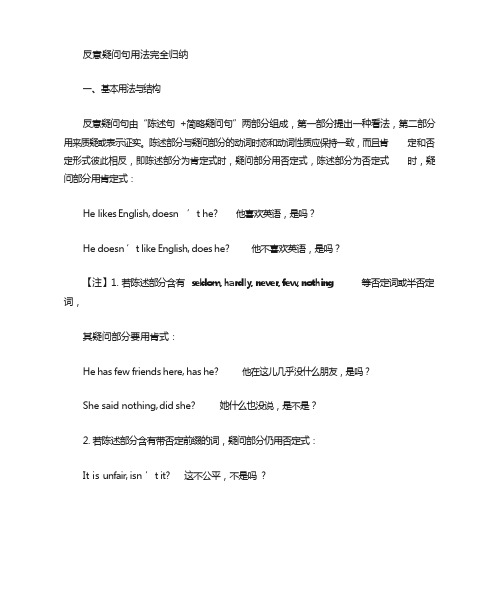
反意疑问句用法完全归纳一、基本用法与结构反意疑问句由“陈述句+简略疑问句”两部分组成,第一部分提出一种看法,第二部分用来质疑或表示证实。
陈述部分与疑问部分的动词时态和动词性质应保持一致,而且肯定和否定形式彼此相反,即陈述部分为肯定式时,疑问部分用否定式,陈述部分为否定式时,疑问部分用肯定式:He likes English, doesn ’t he? 他喜欢英语,是吗?He doesn ’t like English, does he? 他不喜欢英语,是吗?【注】1. 若陈述部分含有seldom, hardly, never, few, nothing 等否定词或半否定词,其疑问部分要用肯式:He has few friends here, has he? 他在这儿几乎没什么朋友,是吗?She said nothing, did she? 她什么也没说,是不是?2. 若陈述部分含有带否定前缀的词,疑问部分仍用否定式:It is unfair, isn ’t it? 这不公平,不是吗?It is impossible, isn ’t it? 那是不可能的,是吗 ?二、反意疑问句的主语问题1.基本原则:疑问部分的主语应与陈述部分主语一致,且只能是代词:Mary is a nurse, isn’t she? 玛丽是护士,对吗?2.当陈述部分为there be 句型时,疑问部分仍用there 作“主语”:There was nothing in the room, was there? 房间里什么也没有,是吗?3.当陈述部分的主语是指示代词时,疑问部分用it, they 等代词:That is a new car, isn ’t it? 这是一辆新汽车,是吗?4.当陈述部分的主语是复合不定代词时,若陈述部分的主语为somebody, someone, everyone, everybody, no one, nobody 等复合不定代词,其反意疑问句的主语在正式文体中用he ,在口语或非正式文体中通常用they :Nobody was late, were they? 没有一个人迟到,是吗 ?5.当陈述部分的主语是something, anything, nothing, everything 等复合不定代词时,其反意疑问句的主语要用it:Everything is ready, isn ’t it? 一切都准备好了吗?Nothing is important, is it? 没有什么重要的,不是吗 ?三、陈述部分有动词 have 的反意疑问句1.当have 为助动词时,其反意疑问句沿用同样的助动词:He has already left, hasn ’t he? 他已经离开了,是吗 ?2.当 have 为实意动词时,要分两种情况:①若表示“所有”,反意疑问句可以用h ave,也可以用do:He has a lot of friends here, hasn ’t [doesn ’t] he? 他在这儿有许多朋友,是吗?但是若陈述部分用的是have 的否定式,反意疑问句用have 还是用 do,取决于陈述部分的动词形式:He hasn ’t any money, has he? 他没有钱,是吗 ?He doesn ’t have any money, does he? 他没有钱,是吗 ?②若表示“吃”、“玩”等意思,反意疑问句要用do:He has supper at 5, doesn ’t he? 他 5 点吃晚餐,是吗 ?He had a good time at the party, didn ’t he? 他在晚会上玩得很开心,是吗 ?3.当用于have to 时,通常也有两种可能:若表示经常性的行为,则多用加助动词do 的形式;若表示特定的行为,则多用have :He often has to get up early, doesn ’t he? 他经常要早起,是吗?He has to go to bed late tonight, hasn ’t he? 他今晚要迟睡,是吗 ?四、含情态动词的反意疑问句1.基本原则:在通常情况下,当陈述部分含有情态动词时,疑问部分会重复前面同样的情态动词:He can speak English, can ’t he ?他会说英语,是吗?Weshouldn ’t go, s hould we? 我们不应该去,对不对?2.当陈述部分含有must 时,要分两种情况:①若must表示“必须”或“有必要”,疑问部分用mustn’t或needn’t:Y ou must leave at once, mustn ’t [needn ’t] you? 你必须(有必要) 马上离开,是吗 ?但是若陈述部分有 mustn ’t 表示禁止,疑问部分要must :Y ou mustn ’t laugh, must you? 你不准笑,知道吗 ?② 若 must 表示推测,疑问部分不能用 must ,而应根据 must 后的动词结构采用相应的动词形式:He must be tired, isn ’t he? 他一定累了,是吗 ?五、陈述部分为祈使句的反意疑问句1.基本原则:若陈述部分为祈使句,疑问部分通常用will you :Please help us, will you? 请帮帮我们,好吗?Come with us, will you? 同我们一起去,好吗?Don’t forget to p ost the le t t er, will you? 请别忘了寄信。
英语反义疑问句的用法归纳总结
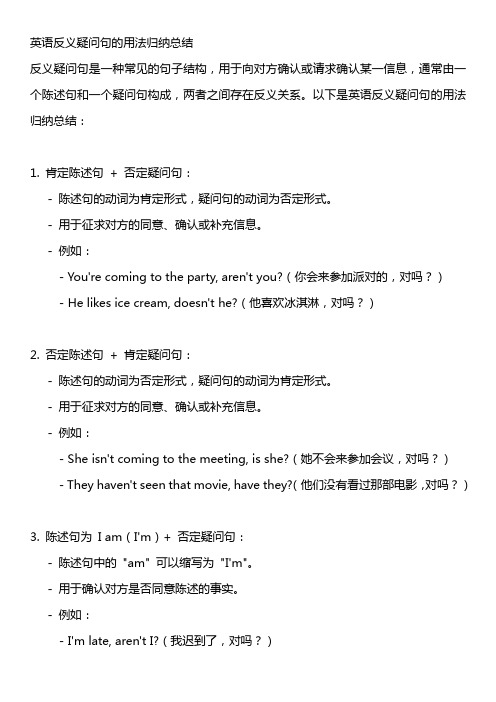
英语反义疑问句的用法归纳总结反义疑问句是一种常见的句子结构,用于向对方确认或请求确认某一信息,通常由一个陈述句和一个疑问句构成,两者之间存在反义关系。
以下是英语反义疑问句的用法归纳总结:1. 肯定陈述句+ 否定疑问句:- 陈述句的动词为肯定形式,疑问句的动词为否定形式。
- 用于征求对方的同意、确认或补充信息。
- 例如:- You're coming to the party, aren't you?(你会来参加派对的,对吗?)- He likes ice cream, doesn't he?(他喜欢冰淇淋,对吗?)2. 否定陈述句+ 肯定疑问句:- 陈述句的动词为否定形式,疑问句的动词为肯定形式。
- 用于征求对方的同意、确认或补充信息。
- 例如:- She isn't coming to the meeting, is she?(她不会来参加会议,对吗?)- They haven't seen that movie, have they?(他们没有看过那部电影,对吗?)3. 陈述句为I am(I'm)+ 否定疑问句:- 陈述句中的"am" 可以缩写为"I'm"。
- 用于确认对方是否同意陈述的事实。
- 例如:- I'm late, aren't I?(我迟到了,对吗?)4. 陈述句中有情态动词+ 肯定疑问句:- 陈述句中有情态动词(如can, could, will, would, should, must等),疑问句的情态动词要与陈述句保持一致。
- 用于确认对方是否同意或能够遵从陈述中的情态动词。
- 例如:- He can swim, can't he?(他会游泳,对吗?)- You will help me, won't you?(你会帮助我,对吗?)5. 陈述句中没有情态动词+ 肯定疑问句:- 陈述句中没有情态动词,疑问句使用"do/does/did" 作为助动词,并保持句子时态一致。
反义疑问句知识点总结
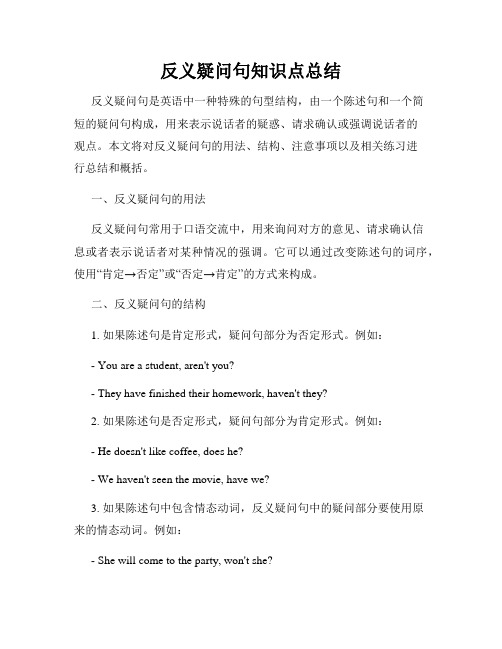
反义疑问句知识点总结反义疑问句是英语中一种特殊的句型结构,由一个陈述句和一个简短的疑问句构成,用来表示说话者的疑惑、请求确认或强调说话者的观点。
本文将对反义疑问句的用法、结构、注意事项以及相关练习进行总结和概括。
一、反义疑问句的用法反义疑问句常用于口语交流中,用来询问对方的意见、请求确认信息或者表示说话者对某种情况的强调。
它可以通过改变陈述句的词序,使用“肯定→否定”或“否定→肯定”的方式来构成。
二、反义疑问句的结构1. 如果陈述句是肯定形式,疑问句部分为否定形式。
例如:- You are a student, aren't you?- They have finished their homework, haven't they?2. 如果陈述句是否定形式,疑问句部分为肯定形式。
例如:- He doesn't like coffee, does he?- We haven't seen the movie, have we?3. 如果陈述句中包含情态动词,反义疑问句中的疑问部分要使用原来的情态动词。
例如:- She will come to the party, won't she?- They can swim, can't they?4. 如果陈述句中使用了“let's”来表示建议,反义疑问句中疑问部分要使用“shall we”。
例如:- Let's go for a walk, shall we?5. 如果陈述句中使用了“there is”或“there are”,反义疑问句中疑问部分要使用“isn't there”或“aren't there”。
例如:- There is a book on the table, isn't there?三、注意事项1. 反义疑问句的结构要与陈述句的主语保持一致。
- She is a doctor, isn't she?(正确)- She is a doctor, aren't you?(错误)2. 主语如果是第三人称单数,疑问句的代词要使用对应的第三人称代词,即“he、she、it”。
- 1、下载文档前请自行甄别文档内容的完整性,平台不提供额外的编辑、内容补充、找答案等附加服务。
- 2、"仅部分预览"的文档,不可在线预览部分如存在完整性等问题,可反馈申请退款(可完整预览的文档不适用该条件!)。
- 3、如文档侵犯您的权益,请联系客服反馈,我们会尽快为您处理(人工客服工作时间:9:00-18:30)。
中考复习系列六句子句子的种类与用法一、中考要求:简单句的基本句型及There be句型是英语学习的基础和重点,也是中考试卷的重点,在书面表达、句子改写和翻译句子中都经常考查有关句子的知识;感叹句、疑问句、宾语从句、状语从句等更是单项选择和句型转换的重点。
因此也是我们复习时要关注的重点。
二、知识要点:句子就是具有一定的语法结构和语调,用来表达一个比较完整的独立意义结构。
句子开头第一个字母要大写,句子末尾要有标点符号。
1.句子的种类——以用途分:句子按照其用途可以分为四种:陈述句、疑问句、祈使句和感叹句。
A.陈述句:用来陈述一件事情或者某种事实、观点的句子。
陈述句可以分为肯定句和否定句两种形式。
例如:肯定句:They often go to school on foot. 他们通常步行去上学。
否定句:My father doesn’t watch TV at home after supper. 我爸爸晚饭后在家不看电视。
B.疑问句:用来提出疑问的句子。
可以分为:一般疑问句、特殊疑问句、选择疑问句和反意疑问句四种类型。
例如:1) 一般疑问句:能够用Yes或者No来回答的疑问句叫一般疑问句,肯定回答用Yes,否定回答用No。
一般疑问句的结构是:Be+主语+表语+……或者是:助动词/情态动词+主语+谓语+……例如:-Are you a teacher 你是老师吗-Yes, I am. 是的,我是。
或:-No, I am not. 不,我不是。
—Does your mother go shopping on Sunday 你妈妈星期天购物吗-Yes, she does. 是的,她经常去购物。
或:-No, she doesn’t.不,她不经常去购物。
—Must we go at once 我们必须立刻走吗—Yes, we must. 是的,必须走。
或:—No, we needn’t. 不,没有必要。
注意:一般疑问句也可用表示肯定或否定的词来回答,如certainly(当然), surely(当然), of course(当然),I think so(我想是的),all right(好吧) certainly not(当然不是), not at all(一点也不), never(从不),sorry(很抱歉),not yet(还没有) I’m afraid not(恐怕不是)等。
2) 特殊疑问句:用来对句子的某一特殊部分提问的句子叫特殊疑问句。
特殊疑问句一般用降调。
其结构是:特殊疑问词+一般疑问句(+……)对它的回答不能用Yes或者No,要根据询问的内容具体回答。
例如:-Where were you at that time 那时你在哪里I was at home. 我在家。
常用的疑问代词有who(谁),whom(谁),whose(谁的),which(哪一个),what(什么);疑问副词有when(何时),where(何地),why(为什么),how(如何)以及“how+形容词”构成的短语。
例如:Who is your teacher 谁是你的老师(指人,作主语)Whom did you telephone to just now 你刚才给谁打电话(指人,作宾语)Whose coat is this 这是谁的大衣(作定语)Which child knows the answer 哪个孩子知道答案(作定语)What class are you in 你在几班(指物,作定语)When will you arrive 你什么时候到(提问时间)Where has he gone 他去了哪里(提问地点)Why are you late again 你为什么又迟到了(提问原因)How do you often go to school 你经常怎么去上学(提问方式)How far is it from your house to your school (how far 提问距离)How often does he go to the French club 他多长时间去一次法语俱乐部(how often 提问频率)3) 选择疑问句:选择疑问句是提供两种或者两种以上的情况,问对方选择哪一种。
其结构可以用一般疑问句也可以用特殊疑问句,之间用连词or链接。
选择疑问句不能用yes或者no来回答,必须选择其中之一来回答。
例如:—Shall we go there by bus or on foot 我们乘坐公共汽车去还是步行去—We’ll go by bus. 我们乘坐公共汽车去。
—Which do you like better, tea or coffee茶和咖啡,你更喜欢哪种—I like tea better. 我更喜欢茶。
4) 反意疑问句:也叫附加疑问句,是在陈述句的后面加一个简短问句,对陈述句所说的事实或者观点提出疑问或希望陈述句部分内容得到证实。
结构为“肯定陈述句+否定问句+”或“否定陈述句+肯定问句+”。
例如:You are coming, aren’t you 你会来的,是吗You can’t swim, can you 你不会游泳,对吗Her brother went to college last yea r, didn’t he 她哥哥去年上的大学,是不是注意:①陈述部分的主句带有no, never, nothing, nowhere, hardly, seldom, few, little等否定词或半否定词时,附加问句用肯定形式。
例如:You hardly speak English, do you 你几乎不能说英语,对吗They have few friends here, have they 他们在这里几乎没有朋友,对吗②There be句型的反意疑问句,其附加问句仍用there。
There will be a party tomorrow, won’t there 明天有个晚会,是不是③陈述部分是一个主从复合句,附加问句一般要和主句一致。
但是当陈述部分是“I’m sure, I’mafraid, I (don’t) think / believe… +宾语从句”结构时,附加问句应与从句一致,而且要注意否定转移现象。
He said he was late for class, didn’t he他说他上课迟到了,是吗I don’t think he is good at math, is he 我认为他不擅长数学,是不是这样(否定转移)④反意疑问句的答语一般要根据事实用yes或no引导的简单问句回答,汉语的翻译有时和英语不一致。
例如:—She can’t swim, can she 她不会游泳,对吗—Yes, she can. 不,她会。
—You weren’t here yesterday, are you 你昨天没有在这里,对吗—No, I wasn’t. 是,我不在。
C.祈使句:祈使句是用来表示请求、命令、劝告、建议等语气的句子。
祈使句的主语一般是第二人称you,但往往省略,谓语一般用动词原形,否定句是用助动词don’t+动词原形+其他。
例如:Don’t be late next time. 下一次不要迟到。
Open the door, please. 请打开门。
有时候祈使句的后面用附加疑问句加强语气。
例如:Don’t tell it anyone, will you 不要告诉任何人,好吗D.感叹句:表示喜怒哀乐等强烈感情的句子叫感叹句。
感叹句的末尾用感叹号。
句子开头经常用what或者how。
How在感叹句中可以修饰形容词、副词、谓语动词等。
例如:How beautiful the skirt is! 这条裙子多漂亮呀!How tall your brother is!你的哥哥多高呀!How time flies! 时间过得真快呀!what在感叹句可以修饰名词。
如果名词是可数名词的单数形式,用what+a/an+名词+主语+谓语!如果是不可数名词或者可数名词的复数形式用What+形容词+名词+主语+谓语!例如:What a tall boy your brother is! 你哥哥是一个多么高的男孩!What beautiful pictures they are! 那些图画多美丽呀!注意:what和how引导的感叹句有时可以互换,但是要注意词序的变化。
例如:他是多聪明的孩子!What a clever boy he is! = How clever a boy he is!= How clever the boy is!2. 句子的种类——以结构分:句子按照其结构可以分为三种类型:简单句、并列句和复合句。
A. 简单句:简单句就是句子只有一个主语和谓语。
简单句有五种基本句型:1) 主语+谓语:这种句型称为主谓结构(S+V),其谓语一般是不及物动词。
例如:The rain stopped. 雨停了。
Things have changed now. 现在事情发生了变化。
2) 主语+连系动词+表语:这种句型称为主系表结构(S+L+P),连系动词在形式上也是一种谓语动词,表语一般是名词或者形容词。
例如:His father is a teacher. 他的爸爸是老师。
(表语是名词)Your mother is very young. 你的妈妈很年轻。
(表语是形容词)3) 主语+谓语+宾语:这种句型称为主谓宾结构(S+V+O),其谓语动词是及物动词,宾语一般是直接宾语。
例如:They often speak English at the meeting. 他们在会上经常说英语。
The house caught fire. 房子着火了。
4) 主语+谓语+宾语+宾语:这种句型称为主谓宾宾结构(S+V+O+O),其谓语动词必须是可以跟双宾语的动词,两个宾语中表示事物的是直接宾语,另一个表示人的是间接宾语。
例如:My father gave me a pen last night. 昨天晚上我爸爸给我一支钢笔。
I will write you a letter when I get there. 我到那里儿时给你写信。
5) 主语+谓语+宾语+宾语补足语:这种句型称为主谓宾补结构(S+V+O+C)其谓语动词必须是可以跟复合宾语的及物动词。
例如:I find him very clever. 我发现他很聪明。
Your words make me angry. 你的话让我很生气。
We all call the baby Sara. 我们都叫这个婴儿莎拉。
I can hear someone playing the violin next door. 我可以听到隔壁有人拉小提琴。
